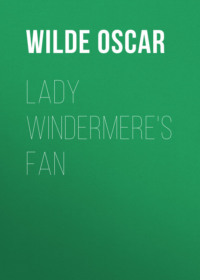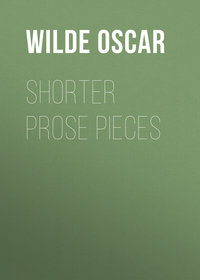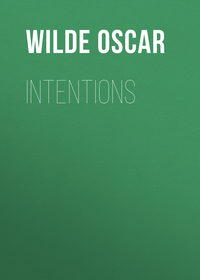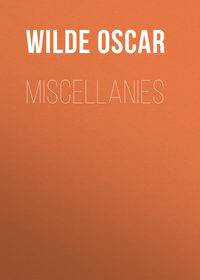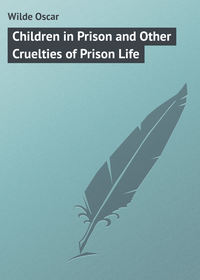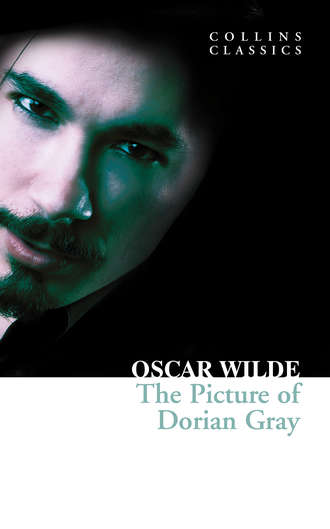
Полная версия
The Picture of Dorian Gray
Hallward painted away with that marvellous bold touch of his, that had the true refinement and perfect delicacy that in art, at any rate, comes only from strength. He was unconscious of the silence.
‘Basil, I am tired of standing,’ cried Dorian Gray, suddenly. ‘I must go out and sit in the garden. The air is stifling here.’
‘My dear fellow, I am so sorry. When I am painting, I can’t think of anything else. But you never sat better. You were perfectly still. And I have caught the effect I wanted—the half-parted lips, and the bright look in the eyes. I don’t know what Harry has been saying to you, but he has certainly made you have the most wonderful expression. I suppose he has been paying you compliments. You mustn’t believe a word that he says.’
‘He has certainly not been paying me compliments. Perhaps that is the reason that I don’t believe anything he has told me.’
‘You know you believe it all,’ said Lord Henry, looking at him with his dreamy, languorous eyes. ‘I will go out to the garden with you. It is horribly hot in the studio. Basil, let us have something iced to drink, something with strawberries in it.’
‘Certainly, Harry. Just touch the bell, and when Parker comes I will tell him what you want. I have got to work up this background, so I will join you later on. Don’t keep Dorian too long. I have never been in better form for painting than I am to-day. This is going to be my masterpiece. It is my masterpiece as it stands.’
Lord Henry went out to the garden, and found Dorian Gray burying his face in the great cool lilac-blossoms, feverishly drinking in their perfume as if it had been wine. He came close to him, and put his hand upon his shoulder. ‘You are quite right to do that,’ he murmured. ‘Nothing can cure the soul but the senses, just as nothing can cure the senses but the soul.’
The lad started and drew back. He was bare-headed, and the leaves had tossed his rebellious curls and tangled all their gilded threads. There was a look of fear in his eyes, such as people have when they are suddenly awakened. His finely-chiselled nostrils quivered, and some hidden nerve shook the scarlet of his lips and left them trembling.
‘Yes,’ continued Lord Henry, ‘that is one of the great secrets of life—to cure the soul by means of the senses, and the senses by means of the soul. You are a wonderful creation. You know more than you think you know, just as you know less than you want to know.’
Dorian Gray frowned and turned his head away. He could not help liking the tall, graceful young man who was standing by him. His romantic olive-coloured face and worn expression interested him. There was something in his low, languid voice that was absolutely fascinating. His cool, white, flower-like hands, even, had a curious charm. They moved, as he spoke, like music, and seemed to have a language of their own. But he felt afraid of him, and ashamed of being afraid. Why had it been left for a stranger to reveal him to himself? He had known Basil Hallward for months, but the friendship between them had never altered him. Suddenly there had come some one across his life who seemed to have disclosed to him life’s mystery. And, yet, what was there to be afraid of? He was not a schoolboy or a girl. It was absurd to be frightened.
‘Let us go and sit in the shade,’ said Lord Henry. ‘Parker has brought out the drinks, and if you stay any longer in this glare you will be quite spoiled, and Basil will never paint you again. You really must not allow yourself to become sunburnt. It would be unbecoming.’
‘What can it matter?’ cried Dorian Gray, laughing, as he sat down on the seat at the end of the garden.
‘It should matter everything to you, Mr. Gray.’
‘Why?’
‘Because you have the most marvellous youth, and youth is the one thing worth having.’
‘I don’t feel that, Lord Henry.’
‘No, you don’t feel it now. Some day, when you are old and wrinkled and ugly, when thought has seared your forehead with its lines, and passion branded your lips with its hideous fires, you will feel it, you will feel it terribly. Now, wherever you go, you charm the world. Will it always be so?…You have a wonderfully beautiful face, Mr. Gray. Don’t frown. You have. And Beauty is a form of Genius—is higher, indeed, than Genius, as it needs no explanation. It is of the great facts of the world, like sunlight, or springtime, or the reflection in dark waters of that silver shell we call the moon. It cannot be questioned. It has its divine right of sovereignty. It makes princes of those who have it. You smile? Ah! when you have lost it you won’t smile…People say sometimes that Beauty is only superficial. That may be so. But at least it is not so superficial as Thought is. To me Beauty is the wonder of wonders. It is only shallow people who do not judge by appearances. The true mystery of the world is the visible, not the invisible…Yes, Mr. Gray, the gods have been good to you. But what the gods give they quickly take away. You have only a few years in which to live really, perfectly, and fully. When your youth goes, your beauty will go with it, and then you will suddenly discover that there are no triumphs left for you, or have to content yourself with those mean triumphs that the memory of your past will make more bitter than defeats. Every month as it wanes brings you nearer to something dreadful. Time is jealous of you, and wars against your lilies and your roses. You will become sallow, and hollow-cheeked, and dull-eyed. You will suffer horribly…Ah! realise your youth while you have it. Don’t squander the gold of your days, listening to the tedious, trying to improve the hopeless failure, or giving away your life to the ignorant, the common, and the vulgar. These are the sickly aims, the false ideals, of our age. Live! Live the wonderful life that is in you! Let nothing be lost upon you. Be always searching for new sensations. Be afraid of nothing…A new Hedonism—that is what our century wants. You might be its visible symbol. With your personality there is nothing you could not do. The world belongs to you for a season…The moment I met you I saw that you were quite unconscious of what you really are, of what you really might be. There was so much in you that charmed me that I felt I must tell you something about yourself. I thought how tragic it would be if you were wasted. For there is such a little time that your youth will last—such a little time. The common hill-flowers wither, but they blossom again. The laburnum will be as yellow next June as it is now. In a month there will be purple stars on the clematis, and year after year the green night of its leaves will hold its purple stars. But we never get back our youth. The pulse of joy that beats in us at twenty, becomes sluggish. Our limbs fail, our senses rot. We degenerate into hideous puppets, haunted by the memory of the passions of which we were too much afraid, and the exquisite temptations that we had not the courage to yield to. Youth! Youth! There is absolutely nothing in the world but youth!’
Dorian Gray listened, open-eyed and wondering. The spray of lilac fell from his hand upon the gravel. A furry bee came and buzzed round it for a moment. Then it began to scramble all over the oval stellated globe of the tiny blossoms. He watched it with that strange interest in trivial things that we try to develop when things of high import make us afraid, or when we are stirred by some new emotion for which we cannot find expression, or when some thought that terrifies us lays sudden siege to the brain and calls on us to yield. After a time the bee flew away. He saw it creeping into the stained trumpet of a Tyrian convolvulus. The flower seemed to quiver, and then swayed gently to and fro.
Suddenly the painter appeared at the door of the studio, and made staccato signs for them to come in. They turned to each other, and smiled.
‘I am waiting,’ he cried. ‘Do come in. The light is quite perfect, and you can bring your drinks.’
They rose up, and sauntered down the walk together. Two green and white butterflies fluttered past them, and in the pear-tree at the corner of the garden a thrush began to sing.
‘You are glad to have met me, Mr. Gray,’ said Lord Henry, looking at him.
‘Yes, I am glad now. I wonder shall I always be glad?’
‘Always! That is a dreadful word. It makes me shudder when I hear it. Women are so fond of using it. They spoil every romance by trying to make it last for ever. It is a meaningless word, too. The only difference between a caprice and a life-long passion is that the caprice lasts a little longer.’
As they entered the studio, Dorian Gray put his hand upon Lord Henry’s arm. ‘In that case, let our friendship be a caprice,’ he murmured, flushing at his own boldness, then stepped up on the platform and resumed his pose.
Lord Henry flung himself into a large wicker armchair, and watched him. The sweep and dash of the brush on the canvas made the only sound that broke the stillness, except when, now and then, Hallward stepped back to look at his work from a distance. In the slanting beams that streamed through the open doorway the dust danced and was golden. The heavy scent of the roses seemed to brood over everything.
After about a quarter of an hour Hallward stopped painting, looked for a long time at Dorian Gray, and then for a long time at the picture, biting the end of one of his huge brushes, and frowning. ‘It is quite finished,’ he cried at last, and stooping down he wrote his name in long vermilion letters on the left-hand corner of the canvas.
Lord Henry came over and examined the picture. It was certainly a wonderful work of art, and a wonderful likeness as well.
‘My dear fellow, I congratulate you most warmly,’ he said. ‘It is the finest portrait of modern times. Mr. Gray, come over and look at yourself.’
The lad started, as if awakened from some dream. ‘Is it really finished?’ he murmured, stepping down from the platform.
‘Quite finished,’ said the painter. ‘And you have sat splendidly to-day. I am awfully obliged to you.’
‘That is entirely due to me,’ broke in Lord Henry. ‘Isn’t it, Mr. Gray?’
Dorian made no answer, but passed listlessly in front of his picture, and turned towards it. When he saw it he drew back, and his cheeks flushed for a moment with pleasure. A look of joy came into his eyes, as if he had recognised himself for the first time. He stood there motionless and in wonder, dimly conscious that Hallward was speaking to him, but not catching the meaning of his words. The sense of his own beauty came on him like a revelation. He had never felt it before. Basil Hallward’s compliments had seemed to him to be merely the charming exaggerations of friendship. He had listened to them, laughed at them, forgotten them. They had not influenced his nature. Then had come Lord Henry Wotton with his strange panegyric on youth, his terrible warning of its brevity. That had stirred him at the time, and now, as he stood gazing at the shadow of his own loveliness, the full reality of the description flashed across him. Yes, there would be a day when his face would be wrinkled and wizen, his eyes dim and colourless, the grace of his figure broken and deformed. The scarlet would pass away from his lips, and the gold steal from his hair. The life that was to make his soul would mar his body. He would become dreadful, hideous, and uncouth.
As he thought of it, a sharp pang of pain struck through him like a knife, and made each delicate fibre of his nature quiver. His eyes deepened into amethyst, and across them came a mist of tears. He felt as if a hand of ice had been laid upon his heart.
‘Don’t you like it?’ cried Hallward at last, stung a little by the lad’s silence, not understanding what it meant.
‘Of course he likes it,’ said Lord Henry. ‘Who wouldn’t like it? It is one of the greatest things in modern art. I will give you anything you like to ask for it. I must have it.’
‘It is not my property, Harry.’
‘Whose property is it?’
‘Dorian’s, of course,’ answered the painter.
‘He is a very lucky fellow.’
‘How sad it is!’ murmured Dorian Gray, with his eyes still fixed upon his own portrait. ‘How sad it is! I shall grow old, and horrible, and dreadful. But this picture will remain always young. It will never be older than this particular day of June…If it were only the other way! If it were I who was to be always young, and the picture that was to grow old! For that—for that—I would give everything! Yes, there is nothing in the whole world I would not give! I would give my soul for that!’
‘You would hardly care for such an arrangement, Basil,’ cried Lord Henry, laughing. ‘It would be rather hard lines on your work.’
‘I should object very strongly, Harry,’ said Hallward.
Dorian Gray turned and looked at him. ‘I believe you would, Basil. You like your art better than your friends. I am no more to you than a green bronze figure. Hardly as much, I dare say.’
The painter stared in amazement. It was so unlike Dorian to speak like that. What had happened? He seemed quite angry. His face was flushed and his cheeks burning.
‘Yes,’ he continued, ‘I am less to you than your ivory Hermes or your silver Faun. You will like them always. How long will you like me? Till I have my first wrinkle, I suppose. I know, now, that when one loses one’s good looks, whatever they may be, one loses everything. Your picture has taught me that. Lord Henry Wotton is perfectly right. Youth is the only thing worth having. When I find that I am growing old, I shall kill myself.’
Hallward turned pale, and caught his hand. ‘Dorian! Dorian!’ he cried, ‘don’t talk like that. I have never had such a friend as you, and I shall never have such another. You are not jealous of material things, are you?—you who are finer than any of them!’
‘I am jealous of everything whose beauty does not die. I am jealous of the portrait you have painted of me. Why should it keep what I must lose? Every moment that passes takes something from me, and gives something to it. Oh, if it were only the other way! If the picture could change, and I could be always what I am now! Why did you paint it? It will mock me some day—mock me horribly!’ The hot tears welled into his eyes; he tore his hand away, and, flinging himself on the divan, he buried his face in the cushions, as though he was praying.
‘This is your doing, Harry,’ said the painter, bitterly.
Lord Henry shrugged his shoulders. ‘It is the real Dorian Gray—that is all.’
‘It is not.’
‘If it is not, what have I to do with it?’
‘You should have gone away when I asked you,’ he muttered.
‘I stayed when you asked me,’ was Lord Henry’s answer.
‘Harry, I can’t quarrel with my two best friends at once, but between you both you have made me hate the finest piece of work I have ever done, and I will destroy it. What is it but canvas and colour? I will not let it come across our three lives and mar them.’
Dorian Gray lifted his golden head from the pillow, and with pallid face and tear-stained eyes looked at him, as he walked over to the deal painting-table that was set beneath the high curtained window. What was he doing there? His fingers were straying about among the litter of tin tubes and dry brushes, seeking for something. Yes, it was for the long palette-knife, with its thin blade of lithe steel. He had found it at last. He was going to rip up the canvas.
With a stifled sob the lad leaped from the couch, and, rushing over to Hallward, tore the knife out of his hand, and flung it to the end of the studio. ‘Don’t, Basil, don’t!’ he cried. ‘It would be murder!’
‘I am glad you appreciate my work at last, Dorian,’ said the painter, coldly, when he had recovered from his surprise. ‘I never thought you would.’
‘Appreciate it? I am in love with it, Basil. It is part of myself. I feel that.’
‘Well, as soon as you are dry, you shall be varnished, and framed, and sent home. Then you can do what you like with yourself.’ And he walked across the room and rang the bell for tea. ‘You will have tea, of course, Dorian? And so will you, Harry? Or do you object to such simple pleasures?’
‘I adore simple pleasures,’ said Lord Henry. ‘They are the last refuge of the complex. But I don’t like scenes, except on the stage. What absurd fellows you are, both of you! I wonder who it was defined man as a rational animal. It was the most premature definition ever given. Man is many things, but he is not rational. I am glad he is not, after all: though I wish you chaps would not squabble over the picture. You had much better let me have it, Basil. This silly boy doesn’t really want it, and I really do.’
‘If you let any one have it but me, Basil, I shall never forgive you!’ cried Dorian Gray; ‘and I don’t allow people to call me a silly boy.’
‘You know the picture is yours, Dorian. I gave it to you before it existed.’
‘And you know you have been a little silly, Mr. Gray, and that you don’t really object to being reminded that you are extremely young.’
‘I should have objected very strongly this morning, Lord Henry.’
‘Ah! this morning! You have lived since then.’
There came a knock at the door, and the butler entered with a laden tea-tray and set it down upon a small Japanese table. There was a rattle of cups and saucers and the hissing of a fluted Georgian urn. Two globe-shaped china dishes were brought in by a page. Dorian Gray went over and poured out the tea. The two men sauntered languidly to the table, and examined what was under the covers.
‘Let us go to the theatre to-night,’ said Lord Henry. ‘There is sure to be something on, somewhere. I have promised to dine at White’s but it is only with an old friend, so I can send him a wire to say that I am ill, or that I am prevented from coming in consequence of a subsequent engagement. I think that would be a rather nice excuse: it would have all the surprise of candour.’
‘It is such a bore putting on one’s dress-clothes,’ muttered Hallward. ‘And, when one has them on, they are so horrid.’
‘Yes,’ answered Lord Henry, dreamily, ‘the costume of the nineteenth century is detestable. It is so sombre, so depressing. Sin is the only real colour-element left in modern life.’
‘You really must not say things like that before Dorian, Harry.’
‘Before which Dorian? The one who is pouring out tea for us, or the one in the picture?’
‘Before either.’
‘I should like to come to the theatre with you, Lord Henry,’ said the lad.
‘Then you shall come; and you will come too, Basil, won’t you?’
‘I can’t really. I would sooner not. I have a lot of work to do.’
‘Well, then, you and I will go alone, Mr. Gray.’
‘I should like that awfully.’
The painter bit his lip and walked over, cup in hand, to the picture. ‘I shall stay with the real Dorian,’ he said, sadly.
‘Is it the real Dorian?’ cried the original of the portrait, strolling across to him. ‘Am I really like that?’
‘Yes; you are just like that.’
‘How wonderful, Basil!’
‘At least you are like it in appearance. But it will never alter,’ sighed Hallward. ‘That is something.’
‘What a fuss people make about fidelity!’ exclaimed Lord Henry. ‘Why, even in love it is purely a question for physiology. It has nothing to do with our own will. Young men want to be faithful, and are not: old men want to be faithless, and cannot: that is all one can say.’
‘Don’t go to the theatre to-night, Dorian,’ said Hallward. ‘Stop and dine with me.’
‘I can’t, Basil.’
‘Why?’
‘Because I have promised Lord Henry Wotton to go with him.’
‘He won’t like you the better for keeping your promises. He always breaks his own. I beg you not to go.’
Dorian Gray laughed and shook his head.
‘I entreat you.’
The lad hesitated, and looked over at Lord Henry, who was watching them from the tea-table with an amused smile.
‘I must go, Basil,’ he answered.
‘Very well,’ said Hallward; and he went over and laid down his cup on the tray. ‘It is rather late, and, as you have to dress, you had better lose no time. Good-bye, Harry. Good-bye, Dorian. Come and see me soon. Come to-morrow.’
‘Certainly.’
‘You won’t forget?’
‘No, of course not,’ cried Dorian.
‘And…Harry!’
‘Yes, Basil?’
‘Remember what I asked you, when we were in the garden this morning.’
‘I have forgotten it.’
‘I trust you.’
‘I wish I could trust myself,’ said Lord Henry, laughing. ‘Come, Mr. Gray, my hansom is outside, and I can drop you at your own place. Goodbye, Basil. It has been a most interesting afternoon.’
As the door closed behind them, the painter flung himself down on a sofa, and a look of pain came into his face.
CHAPTER 3
At half-past twelve next day Lord Henry Wotton strolled from Curzon Street over to the Albany to call on his uncle, Lord Fermor, a genial if somewhat rough-mannered old bachelor, whom the outside world called selfish, because it derived no particular benefit from him, but who was considered generous by Society as he fed the people who amused him. His father had been our ambassador at Madrid when Isabella was young, and Prim unthought of, but had retired from the Diplomatic Service in a capricious moment of annoyance at not being offered the Embassy at Paris, a post to which he considered that he was fully entitled by reason of his birth, his indolence, the good English of his despatches, and his inordinate passion for pleasure. The son, who had been his father’s secretary, had resigned along with his chief, somewhat foolishly as was thought at the time, and on succeeding some months later to the title, had set himself to the serious study of the great aristocratic art of doing absolutely nothing. He had two large town houses, but preferred to live in chambers, as it was less trouble, and took most of his meals at his club. He paid some attention to the management of his collieries in the Midland counties, excusing himself for this taint of industry on the ground that the one advantage of having coal was that it enabled a gentleman to afford the decency of burning wood on his own hearth. In politics he was a Tory, except when the Tories were in office, during which period he roundly abused them for being a pack of Radicals. He was a hero to his valet, who bullied him, and a terror to most of his relations, whom he bullied in turn. Only England could have produced him, and he always said that the country was going to the dogs. His principles were out of date, but there was a good deal to be said for his prejudices.
When Lord Henry entered the room, he found his uncle sitting in a rough shooting-coat, smoking a cheroot, and grumbling over The Times. ‘Well, Harry,’ said the old gentleman, ‘what brings you out so early? I thought you dandies never got up till two, and were not visible till five.’
‘Pure family affection, I assure you, Uncle George. I want to get something out of you.’
‘Money, I suppose,’ said Lord Fermor, making a wry face. ‘Well, sit down and tell me all about it. Young people, nowadays, imagine that money is everything.’
‘Yes,’ murmured Lord Henry, settling his buttonhole in his coat; ‘and when they grow older they know it. But I don’t want money. It is only people who pay their bills who want that, Uncle George, and I never pay mine. Credit is the capital of a younger son, and one lives charmingly upon it. Besides, I always deal with Dartmoor’s tradesmen, and consequently they never bother me. What I want is information; not useful information, of course; useless information.’
‘Well, I can tell you anything that is in an English Blue-book, Harry, although those fellows nowadays write a lot of nonsense. When I was in the Diplomatic, things were much better. But I hear they let them in now by examination. What can you expect? Examinations, sir, are pure humbug from beginning to end. If a man is a gentleman, he knows quite enough, and if he is not a gentleman, whatever he knows is bad for him.’
‘Mr. Dorian Gray does not belong to Blue-books, Uncle George,’ said Lord Henry, languidly.



